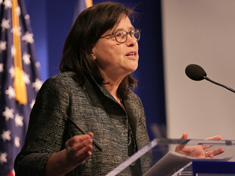-
Mariam Claeson: Quality, Not Quantity of Care for Maternal and Child Health
April 29, 2016 By Sean Peoples “It’s not about counting how many times a mother interacts with antenatal services or comes to the facility,” says Dr. Mariam Claeson, the director of maternal newborn and child health at the Bill and Melinda Gates Foundation, in this week’s podcast. “But it’s what happens in these encounters that matters.”
“It’s not about counting how many times a mother interacts with antenatal services or comes to the facility,” says Dr. Mariam Claeson, the director of maternal newborn and child health at the Bill and Melinda Gates Foundation, in this week’s podcast. “But it’s what happens in these encounters that matters.”“It’s not about counting how many times a mother interacts with antenatal services or comes to the facility,” says Dr. Mariam Claeson, the director of maternal newborn and child health at the Bill and Melinda Gates Foundation, in this week’s podcast. “But it’s what happens in these encounters that matters.”
One month after the United Nations adopted the Sustainable Development Goals (SDGs), Claeson and her colleagues in the maternal health community met in Mexico City at the 2015 Global Maternal and Newborn Health Conference. The conference marked the first opportunity for health and development advocates to take stock of the successes and failures of the Millennium Development Goals and discuss a common strategy for implementing the maternal health targets of the SDGs.
Improving and measuring quality of care, and not only quantity, was a major focus. For Claeson, such a “woman-centered” approach is best achieved with an integrative model of care – one that combines primary care, family planning services, reproductive health, and other entry points into the health system so women do not need to go to separate facilities for each. “We know,” she says, “that there is a very strong evidence base for why one should do integrative care, integrative measurement, and quality delivery.”
Since Mexico City, Claeson says that global partners have been gearing up “to think more systematically about quality across the continuum” as well as a “systems approach to quality and countries wanting to make that part of their broader national quality movement.”
“This is the first time,” Claeson continues, “we have countries committed to actually reducing…maternal and newborn mortality in the SDGs.” And, she says, thanks to Every Woman Every Child, a roadmap created by UN Secretary-General Ban Ki-moon in 2010, “we have targets to monitor progress.”
In a month, many in the global maternal health community will descend on Copenhagen for Women Deliver 2016. The conference is a chance to further capitalize on momentum around the integrative model laid out in Mexico City.
Yet, Claeson warns that staying focused on women, girls, mothers, and newborns will require a larger effort. “It’s not just the business of the health sector,” she says, “but how do we get other sectors to also stay focused when we talk about women and girls?”
Dr. Mariam Claeson spoke at the Wilson Center on April 13, 2016.
Friday Podcasts are also available for download on iTunes and Google Podcasts.
 A Publication of the Stimson Center.
A Publication of the Stimson Center.

 “It’s not about counting how many times a mother interacts with antenatal services or comes to the facility,” says Dr. Mariam Claeson, the director of maternal newborn and child health at the Bill and Melinda Gates Foundation, in this week’s podcast. “But it’s what happens in these encounters that matters.”
“It’s not about counting how many times a mother interacts with antenatal services or comes to the facility,” says Dr. Mariam Claeson, the director of maternal newborn and child health at the Bill and Melinda Gates Foundation, in this week’s podcast. “But it’s what happens in these encounters that matters.”

